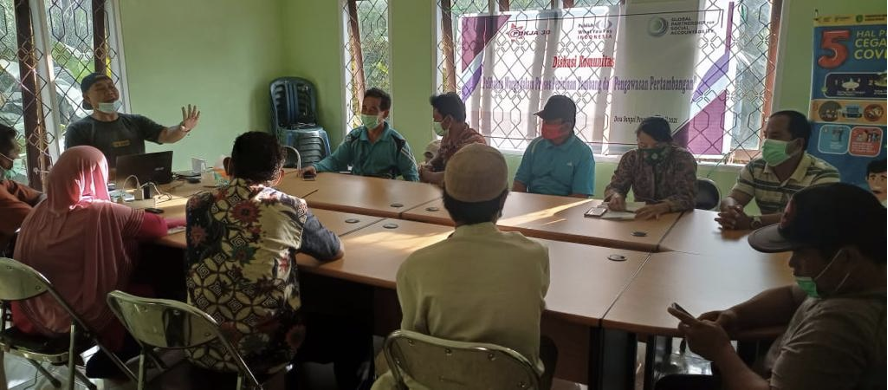
That afternoon, around 13 residents of Sungai Payang Village gathered at the Village-Owned Enterprises Office of Sungai Payang Village, Kukar, East Kalimantan . Putting their daily affairs aside, residents consisting of 2 (two) women representatives, youth leaders, community leaders, and citizens gather to find solutions to the problems caused by 14 mining companies and oil palm plantations around their homes.
Acting as a facilitator, Buyung Marajo and his partner from the Pokja-30, opened and facilitated a discussion gathering on Friday, May 7, 2021, by listening to residents’ complaints regarding the mining operations. Pokja-30 is an organization that actively advocates the use of public funds, oil and gas, mining and forestry revenues monitoring, and access to information.
One of the residents started his story regarding damaged roads, lack of employment in local villages, and water pollution are at least three main problems caused by mining and palm oil companies activities in Sungai Payang. Then the discussion began heated-up when one of the participants and the head of the cooperative in Donomulyo Village shared how they were affected by the waste of a coal mining company that operates in their village. He hopes the discussion forum can accommodate and convey the community’s aspirations so that a solution can be found for the residents of Donomulyo Village. Residents of Donomulyo have released a demand to normalize the river, as mentioned by the head of the village. The minutes of the meeting of the residents gathering demand to build a sealing pond under the road. The village head has also made an official report and forwarded it to the coal mining company, but there has been no response from the company by the time this article is written. Even now, there are more companies operating in their village, whereas the first problem is not yet finished. “So, no involvement at all, talking about impact, our village is the worst,” said the village head closing the story.
One of the women’s representatives in the discussion and one of the affected residents, especially in the land tenure case, said that her family in Kukar owns several lands and plantations in some areas. In 2020, the company evicted three lands and had yet to make payments to the affected people. The land area is 8 hectares, but other residents occupy the land and get the compensation even though those people do not have the official land ownership certificate. “Those who do not have land ownership certificates have been compensated by the company, while us who have the official land ownership certificate have not had any discussions,” she said.
She has visited a few companies which have offices in Tenggarong. Because they had a clean and clear land ownership certificate, the company finally agreed to pay the compensation, but the company also divided the compensation with those people who didn’t have a land ownership certificate. In the end, the remaining compensation was only for about 3 hectares of land. Even though there is a clear land boundary.
The second land is facing the same problem, located in Gunung Payang, initially covering 11 hectares, and this mining company has acquired about 3 hectares, but there has been no compensation until now. “There was no intention of that mining company to meet us. We often go to the village head office and have helped communicate with the company, but there has been no response. In the end, we came alone, but no one from the company wanted to meet us. We feel colonized in our village,” she said. The third land, she continued, is a case with another mining company. Even so, the company was quite responsive. When she came directly to their office, the company’s public relations officer openly wanted to meet her. After that, the company also went to the village, paid for land compensation every month even though it was not following what was demanded, “at least there is [the company’s] responsibility,” she said.
“The land issue has happened three times, at least with us. Is this the way the company came in here to harm us? We are still trying to get compensation, but we do not have the resources to sue the company and bring it to the court. In the village, many people have experienced the same problems.”
“I was once inviting our neighbours who are also affected by the waste pollution. Let’s report it, but they are afraid. And then, I become silent. If those who own [the land] don’t want to fight, how can I fight? This is the case with one of the coal mining companies,” she added.
Wishful thinking, the residents hope that there is an easy complaint handling/monitoring mechanism, showing the location affected, with quick response, and solutions. Delivered the solution, not only giving a gimmick answer, “road revitalization, as an example, we kind of forget the problems because there is no solution yet”, mentioned by one of the residents.
For the note, the government already had a complaint handling system/monitoring system called LAPOR! 1708 and already being integrated with the Ombudsman of the Republic of Indonesia, also already integrated with lots of regions including Kaltim. The GPSA project introduces these ICT tools and arranges a few training sessions on how to use the ICT tools such as LAPOR! 1708 and ESDM 136. ICT tools facilitate citizens to give public service complaints and use confidential anonymous features so they do not need to be afraid anymore.